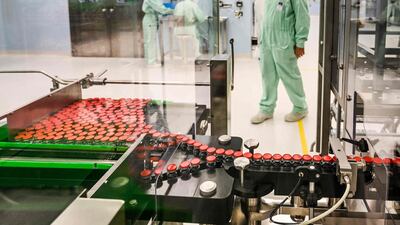The UK and EU moved to calm tensions over access to Covid-19 vaccines after the bloc proposed tougher restrictions on the export of the medicines.
Britain and the European Commission issued a joint statement saying they wanted to create a win-win situation.
EU leaders were set to hold online talks on Thursday to discuss ways to boost vaccine supplies across the continent.
At the summit, European Commission President Ursula von der Leyen will ask leaders to back her plans to restrict exports of vaccines based on the destination country’s inoculation rates.
It stops short of a full export ban but Europe will also insist on reciprocity – meaning supplies will be restricted from going to countries that do not send doses back.
The EU previously said it wants two AstraZeneca plants in the UK to deliver doses to the continent.
“Given our interdependencies, we are working on specific steps we can take in the short, medium and long term to create a win-win situation and expand vaccine supply for all our citizens,” the UK and EU said in a statement on Wednesday.
“In the end, openness and global co-operation of all countries will be key to finally overcome this pandemic and ensure better preparation for meeting future challenges. We will continue our discussions.”
Officials on both sides said they had not reached a supply deal, but it was the beginning of a negotiation.
The joint statement came after the discovery of a stockpile of 29 million shots in an Italian factory.
The EU has become increasingly frustrated with pharmaceutical companies – particularly AstraZeneca – over a shortfall in supplies to the bloc.
At the same time, the UK’s vaccine drive raced ahead. About 45 per cent of British citizens have received a Covid-19 shot, compared with 14 per cent in the EU.
British officials were this week in Brussels negotiating with the European Commission over how to divide up stock from an AstraZeneca plant in the Netherlands. That followed a spat over why the company was sending vaccines to the UK but was not meeting its commitments to the EU.
Sir Jeremy Farrar, chief executive of the Wellcome Trust health research charity, said he hoped there would be “an outbreak of statecraft” between the two sides.
"Export bans will have huge ramifications," he told BBC's Radio 4 Today programme on Thursday.
“The biggest risk is that new variants appear anywhere in the world and eventually come back to haunt us in our own countries. If we allow that to happen by increasing transmission around the world and not offering vaccines, then this pandemic will continue for months and years to come.”
Former Finnish prime minister Alexander Stubb said a “tit for tat” dispute between the two sides “simply doesn’t work”.
“We need to respect all of the casualties and we need to tone down the discussion and the debate. We’re all in this together,” he told Sky News.
Under the EU’s export plan, there will still be no automatic bans. Officials will take into account a nation’s vaccination rate and pandemic situation when deciding whether to approve shipments.
While the bloc is a major exporter of vaccines, Ms von der Leyen said “open roads should run in both directions”.

